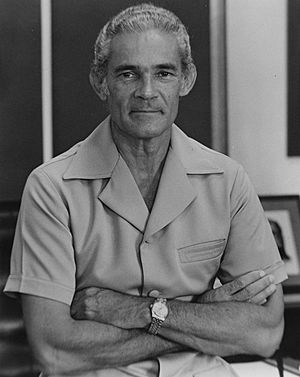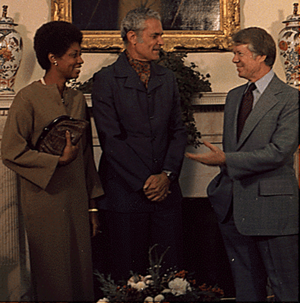Michael Manley facts for kids
Michael Norman Manley (born December 10, 1924 – died March 6, 1997) was a Jamaican politician. He served as the fourth Prime Minister of Jamaica twice, first from 1972 to 1980, and then again from 1989 to 1992. Manley believed in a system called democratic socialism. This means he wanted the government to help make society fairer for everyone, while also allowing private businesses to operate. He was very popular with ordinary people and is remembered as one of Jamaica's most liked prime ministers.
Quick facts for kids
The Most Honourable
Michael Manley
ON OM OCC PC
|
|
|---|---|

Manley c. 1970s
|
|
| 4th Prime Minister of Jamaica | |
| In office 10 February 1989 – 30 March 1992 |
|
| Monarch | Elizabeth II |
| Governor General | Sir Florizel Glasspole Sir Edward Zacca (acting) Sir Howard Cooke |
| Preceded by | Edward Seaga |
| Succeeded by | P. J. Patterson |
| In office 2 March 1972 – 1 November 1980 |
|
| Monarch | Elizabeth II |
| Governor General | Sir Clifford Campbell Sir Herbert Duffus (acting) Sir Florizel Glasspole |
| Preceded by | Hugh Shearer |
| Succeeded by | Edward Seaga |
| Leader of the Opposition | |
| In office 1 November 1980 – 10 February 1989 |
|
| Monarch | Elizabeth II |
| Prime Minister | Edward Seaga |
| Preceded by | Edward Seaga |
| Succeeded by | Edward Seaga |
| In office 1969 – 2 March 1972 |
|
| Monarch | Elizabeth II |
| Prime Minister | Hugh Shearer |
| Preceded by | Norman Manley |
| Succeeded by | Hugh Shearer |
| MP for Kingston East and Port Royal | |
| In office 1989–1993 |
|
| Preceded by | Eric Anthony Abrahams |
| Succeeded by | Marjorie Taylor |
| Personal details | |
| Born |
Michael Norman Manley
10 December 1924 Saint Andrew Parish, Jamaica |
| Died | 6 March 1997 (aged 72) Kingston, Jamaica |
| Resting place | National Heroes Park |
| Political party | People's National Party |
| Spouses |
Jacqueline Kamellard
(m. 1946; div. 1951)Thelma Verity
(m. 1955; div. 1960)Barbara Lewars
(m. 1966; died 1968)Beverley Anderson
(m. 1972; div. 1990)Glynne Ewart
(m. 1992) |
| Children | 5, including Rachel |
| Parents | Norman Manley Edna Manley |
| Alma mater | London School of Economics |
| Military service | |
| Allegiance | |
| Branch/service | |
| Years of service | 1943–1945 |
| Rank | Pilot officer |
| Battles/wars | World War II |
Contents
Early Life and Education
Michael Manley was the second son of Norman Washington Manley, who was a premier of Jamaica, and Edna Manley, an artist. He went to Jamaica College from 1935 to 1943. After that, he attended Antigua State College.
During World War II, he served in the Royal Canadian Air Force. In 1945, he went to the London School of Economics in England. There, he learned about Fabian socialism, which is a type of socialism that aims for gradual change. He finished his studies in 1949.
After returning to Jamaica, Manley worked as an editor and writer for a newspaper called Public Opinion. Around the same time, he became involved in the trade union movement. Trade unions are groups that help workers get fair pay and good working conditions. He became a negotiator for the National Workers Union (Jamaica) in 1953.
Starting in Politics
When his father became premier of Jamaica in 1955, Michael Manley didn't want to enter politics right away. He didn't want people to think he was only succeeding because of his famous family name.
However, in 1962, he agreed to join the Senate of the Parliament of Jamaica. He was later elected to the Jamaican House of Representatives for the Central Kingston area in 1967.
In 1969, after his father retired, Manley was chosen as the leader of the People's National Party. He then served as the Leader of the Opposition (Jamaica) until his party won the general elections in 1972.
Major Changes in Jamaica
In the 1972 Jamaican general election, Manley's People's National Party won by a lot. They took 37 out of 53 seats, defeating the current Prime Minister, Hugh Shearer.
Manley then started many social and economic changes. Even though he came from a wealthy family, his background in trade unions helped him connect with the majority of poor people in Jamaica. He was a very energetic and popular leader.
Unlike his father, who was known for being formal, Michael Manley made Parliament more open to everyone. He removed the rule that men had to wear jackets and ties to its meetings. He often wore a Kariba suit, which is a more relaxed, formal jacket and trousers worn without a shirt and tie.
Under Manley's leadership, Jamaica set a minimum wage for all workers, including those who work in homes. In 1974, his party officially adopted the idea of Democratic Socialism.
Education and Land Reform
In 1974, Manley suggested making education free for everyone, from primary school to university. Making secondary education free was a big step. It helped remove barriers that stopped people from getting good jobs if they didn't have a secondary school diploma.
In 1974, Manley's government also created the Jamaica Movement for the Advancement of Literacy (JAMAL). This program helped adults learn to read and write, aiming to help 100,000 adults each year.
His government also worked on land reform. This meant trying to make land ownership fairer in Jamaica. A program called Project Land Lease, started in 1973, gave land, advice, and loans to tens of thousands of small farmers.
Workers' Rights and Social Programs
Manley's government made many changes to help people. The minimum voting age was lowered to 18 years old. Women were given equal pay for equal work. New laws also made sure women could take maternity leave when they had a baby.
An old law called the Masters and Servants Act, which treated workers unfairly, was removed. A new law, the Labour Relations and Industrial Disputes Act, gave workers and their unions more rights.
The National Housing Trust was also created. This program helped many working people buy their own homes. It also led to the building of over 40,000 houses between 1974 and 1980.
Other programs included:
- Subsidized meals, transportation, and uniforms for schoolchildren from poor families.
- Free education at all levels.
- Special job programs and programs to fight illiteracy.
- Increased payments for pensions (for older people) and poor relief (for those in need).
- Better training for young people and more day care centers.
- Improvements to hospitals.
- Free health care for all Jamaicans.
- New health clinics and trained health workers in rural areas.
- Increased spending on education and more doctors and dentists.
- Rules to control rent and prices.
- Protection for workers against unfair dismissal.
- Subsidies on basic food items in 1973.
- Automatic recognition of unions in workplaces.
Manley was the first Jamaican prime minister to support Jamaican republicanism. This idea meant changing Jamaica from a constitutional monarchy (where the British monarch is head of state) to a republic (with its own head of state). In 1975, his government suggested this change. In 1977, Manley announced that Jamaica would become a republic by 1981, but this did not happen.
International Relations

Michael Manley became good friends with several leaders of socialist countries, like Julius Nyerere of Tanzania, Olof Palme of Sweden, and Fidel Castro of Cuba. Manley's support for Cuba sending troops to Angola during the Angolan Civil War caused some disagreement with the United States.
In December 1977, Manley visited US President Jimmy Carter to improve relations. Their meeting helped relations get a bit better.
Manley also strongly supported the Non-Aligned Movement. This was a group of countries that did not want to take sides with either the United States or the Soviet Union during the Cold War.
Time in Opposition
After losing the 1980 election, Manley became the Leader of the Opposition. He often spoke out against the new government.
In 1983, when Prime Minister Maurice Bishop of Grenada was overthrown, Manley strongly opposed Jamaica sending troops to Grenada. After this, the Prime Minister, Edward Seaga, called an early election. Manley decided that his party would not take part in these elections. Because of this, the Jamaica Labour Party won almost all the seats in Parliament.
Return to Power
By 1989, some people thought Manley had changed his views on socialism. He started to openly support a role for private businesses in the economy.
Edward Seaga's government faced problems, including not delivering on promises and complaints about how they handled Hurricane Gilbert in 1988. These issues led to Seaga's defeat in the 1989 Jamaican general election. Manley's party won 45 seats compared to the other party's 15.
Manley's second time as Prime Minister focused on making Jamaica's economy more open. This was different from his first term. However, his government also put in place programs to help people during these economic changes. A Social Support Programme was introduced to help poor Jamaicans. It also focused on creating jobs, training, and loans for many people.
The government also increased food assistance for vulnerable groups, like pregnant women and children. They also created some community councils. A limited land reform program was carried out, giving land to hundreds of small farmers. The government also did well in providing housing and took steps to protect consumers from unfair business practices.
In 1992, Michael Manley stepped down as Prime Minister and party leader due to health reasons. His Deputy Prime Minister, P. J. Patterson, took over both roles.
Family Life
Michael Manley was married five times. His first marriage was to Jacqueline Kamellard in 1946, which ended in 1951. In 1955, he married Thelma Verity, but this marriage also ended in 1960. In 1966, he married Barbara Lewars, who passed away in 1968. In 1972, he married Beverley Anderson, and their marriage ended in 1990. Beverley later wrote a book about their life together. Michael Manley's last marriage was to Glynne Ewart in 1992.
Manley had five children from his marriages: Rachel Manley, Joseph Manley, Sarah Manley, Natasha Manley, and David Manley.
Later Years and Passing
Michael Manley wrote seven books. One of his most famous is A History of West Indies Cricket, where he talked about how cricket was connected to West Indian nationalism. Other books he wrote include The Politics of Change and The Search for Solutions.
Michael Manley passed away on March 6, 1997, from prostate cancer. He is buried at the National Heroes Park in Jamaica, where his father Norman Manley is also buried. A picture of Michael Manley is featured on the Jamaican $1,000 note.
Honours and Awards
- 1973: Order of the Liberator, Venezuela
- 1976: Order of José Martí
- 1978: United Nations Medal
- 1989: Member of the Privy Council of the United Kingdom (P.C.)
- 1992: Order of Merit of Jamaica (O.M.)
- 1994: Order of the Caribbean Community (O.O.C.)
After his death:
- Order of the Nation (O.N.)
Images for kids
See also
 In Spanish: Michael Manley para niños
In Spanish: Michael Manley para niños
 | Sharif Bey |
 | Hale Woodruff |
 | Richmond Barthé |
 | Purvis Young |



